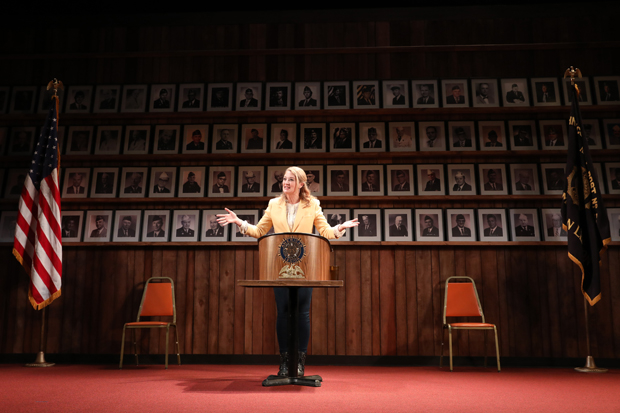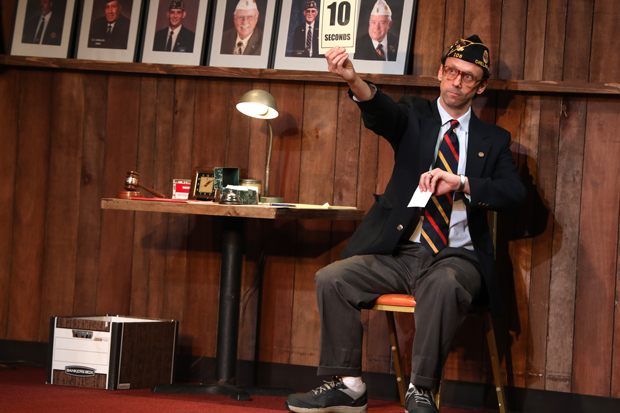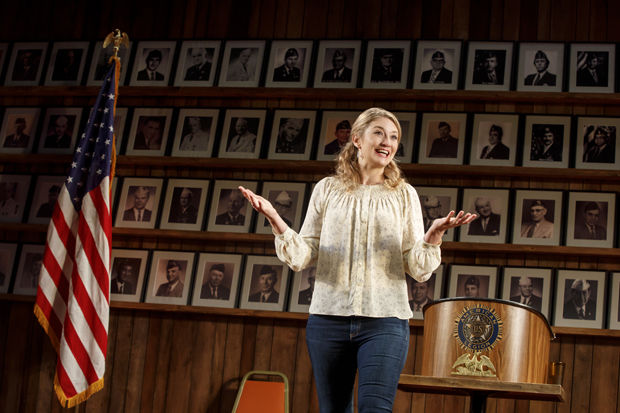What the Constitution Means to Me and You
Heidi Schreck scrutinizes the vitality of the US constitution in her new play at New York Theatre Workshop.

(© Joan Marcus)
A revolution is brewing at New York Theatre Workshop. That's where Heidi Schreck is debuting her not-quite-solo play, What the Constitution Means to Me, an X-ray examination of our republic's founding document that brilliantly straddles the border between ode and indictment. I left the theater with an electric current running through my body the likes of which I haven't felt since Hamilton.
You wouldn't expect this from a first glance at the bland Foreign Legion Hall that occupies the stage, all red carpeting, wood paneling, flags, and lectern (evocative set design by Rachel Hauck). Schreck (author of the gut punch of a drama Grand Concourse) frames her show as an attempt to recreate her adolescent passion for speech and debate, when she would travel to halls like these and deliver her spiel on the Constitution in an effort to win scholarship money (for the record, she financed her entire college degree this way). A caffeinated speech about why the constitution is the active crucible of democracy butts up against hindsight as she attempts to reconcile her faith in the slow progress of self-government with the wisdom gained over 40 years of living in the United States.

(© Joan Marcus)
Schreck peppers her talk on the 14th amendment (the one that guarantees equal protection under the law) with a painful family history that illustrates how the promise of equality has so often fallen short. For instance, there's the tale of her great-great-grandmother, a mail-order bride who died of melancholia in a mental institution. Then there's her grandmother, who lived under the daily threat of domestic violence she was too terrified and desperate to report.
Schreck brings her timeline into the 21st century by raising the 2005 Supreme Court decision Castle Rock v. Gonzales, which found that a town and its police department were not liable for failing to enforce a restraining order (a failure that resulted in the deaths of three young girls). Coming as it did for me on the day that the Senate Judiciary Committee heard testimony from both Christine Blasey Ford and Supreme Court nominee Brett Kavanaugh, What the Constitution Means to Me made it impossible to dispute that one man's pursuit of happiness is often another man's (or, more likely, woman's) personal hell.

(© Joan Marcus)
And yet Schreck approaches her subject with such implacable enthusiasm that it would be ludicrous to label the show a downer. Her supernova energy is as infectious as it is disarming; we chuckle at her hilarious delivery right up to the moment she slaps us with some incredibly uncomfortable bit of information. This is a play that is guaranteed to make you laugh, but will never really let you get comfortable.
A good foil for Schreck's off-the-wall mania, Mike Iveson plays a staid legionary, a man just slightly more animated than a Macy's mannequin. He's meant to be keeping time, but as he stares blankly through one of Schreck's filibusters, we know we've drifted away from the realm of strict reenactment.
In the latter third of the play, Schreck invites real-life teen debater Rosdely Ciprian to the stage for a debate about whether the Constitution should be abolished and replaced. It's thrilling and the audience really gets into it, not least of which because of Ciprian's on-point and stinging delivery (I have no doubt we'll be seeing her on C-SPAN one day).

(© Joan Marcus)
Director Oliver Butler helms with a steady hand that accentuates the unique aspects of this play that never quite feels like a play: The actors step out of their roles to share personal anecdotes, dressed in plausibly modern street clothes (costumes by Michael Krass). Jen Schriever's lighting design keeps us focused on the stage while regularly invading the house and inviting us in. The usual trappings of theater easily fall away, leaving the performers and audience as just a group of people telling stories and sharing ideas in the room.
Shreck makes us believe that the American Revolution is an ongoing project, that our frequent internal conflicts are how that revolution replenishes itself. More importantly, she reasserts theater as a radical act — one that feels even more essential in this digital age: Cut off from our screens and social media algorithms, we are left in the same physical space with our dangerous ideas. No, the revolution will not be televised, text-messaged, or tweeted: It's happening live onstage. What the Constitution Means to Me ought to run at least as long as our country does.








